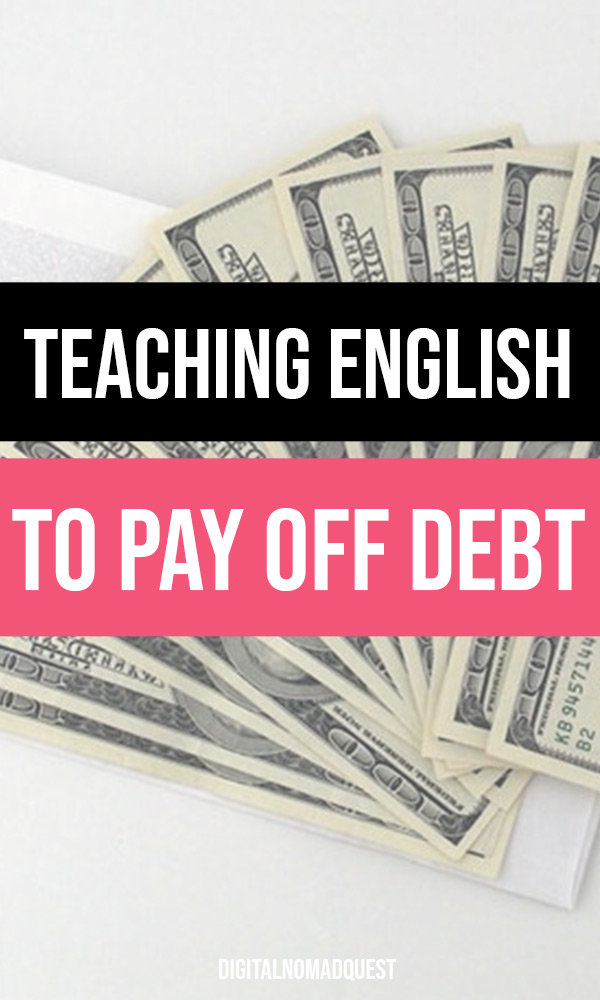In this post we’ll cover teaching English as a foreign language to pay off student loan debt! So, you’ve graduated from college. It could have been last month, or it could have been a decade ago. The point is, you graduated. Perhaps, you happen to be one of the many people with student loan debt. Welcome to the club! There is over $1.41 trillion in outstanding student loan debt in the United States. The average student in our country has student loan debt around $35K. (I wish mine were that low.) Having this debt can feel like a burden. Not only that, it can feel incredibly limiting. You spent so much time busting your butt to get a degree, and now you have to bust your butt some more to pay it off. When will you get to live? When will you get to travel?
What if I told you soon? What if I told you, you could go abroad and pay off your student loan debt simultaneously. What if I told you that it could be relatively easy to do? Would you believe it? Well…
You can go abroad soon.
You can go abroad soon, and you can pay off your student loan debt at the same time.
You can go abroad soon, and you can pay off your student loan debt at the same time, AND IT CAN BE EASY.
How? Teaching English abroad. Before we dive in, for reference purposes, I’ll be using acronyms frequently. Here is the explanation:
- Teaching English as a Foreign Language – TEFL
- Teaching English as a Second Language – TESL
- Teaching English as a Second Language Online – TESOL
Teaching English as a Foreign Language to Pay Off Student Loan Debt
How To Choose
There are many TEFL/TESL/TESOL courses to pick from, and once you find the right program to invest in, you’re off to the races. Yes, I said invest.
As you know, from your sizeable student loan debt, education is an investment. These courses are significantly cheaper than going to University and, arguably, have a quicker return on investment. These courses can range from under $300 to over $3,000. Most of the more popular programs are between $1200 and $2000. There is always the argument that you get what you pay for. I don’t necessarily agree with this expression. Not for clothing and not for education. If you do your due diligence and find a program that matches your needs, you may not have to pay top tier prices to earn your certification.
How do you know what your needs are? Maybe let’s start with looking these three questions:
Is there somewhere you want to live?
How quickly do you want to pay your debt off?
Which one is more important to you? If you can’t decide you’ll get to the same place, I’d recommend answering one. If you know where you want to live, then you can pick a course that is targeted for that area and then budget after you get a job placement. If you know how quickly you want to pay off your debt, you can research where the highest-paid TESL teachers live and then pick a course accordingly. There is always the chance that you find a program you really without answering these questions. You can select a country that they cater their curriculum, too, and then budget after you get a job placement. No matter how you go about deciding, you’ll be one step closer to lightening your debt load and broadening your horizons.

Do You Need A Certificate to Teach Abroad?
There was a time, back in the day, when educators weren’t required to have certificates. That day has passed. There is always the chance that you could find an employer who will higher you because you have previous teaching experience. If that is the case, due your due diligence. There are bad employers all over the world, not just the US.
Accredited Or Not?
To pick a program, you’ll want to decide whether you care if the program is accredited or not. Generally speaking, the TEFL/TESL/TESOL program does not have to be accredited. Some schools create their own accreditation programs or join societies that make them appear to be accredited but are not recognized by the major accrediting institutions. Those institutions are:
TQUK, College of Teachers, ACCET. Courses offered directly through an accredited university will also be considered accredited, including SIT, Cambridge University (CELTA), Trinity University (Trinity certificate).
General Requirements for Accredited Courses
There are general requirements that employers look for when hiring educators. These requirements were established by the previously mentioned accrediting institutions. The TEFL/TESL/TESOL certification course should be at least 120 hours. The minimum standard for accreditation is 100 hours of academics and 6-20 hours of live practice teaching to actual ESL students. Reputable employers will not recognize any lesser certification. Beyond that, you should also set your sights on gaining as much experience as possible. Going into a classroom to educate the future population of a country is an incredible responsibility. You owe it to them to be prepared, do you not?
Time Commitment
I know, you eager beaver, you want to know how long it will take. You wrapped up 20+ years of school and now you have to endure more. Don’t worry, it’s not that much more. A standard in-person course is 4 weeks long (20 classroom days). A comparable part-time class or interactive online course will typically take 2-3 months part-time.
Online certifications are generally the more inexpensive and flexible option, suited well for those with some teaching experience, while in-person courses offer more comprehensive practical training.
Programs
When you’re researching courses, remember, most potential employers around the world will not recognize a certification that does not incorporate a practicum. There’s also something else to consider, will you want to move around? Some courses are accepted internationally, while others are geared for specific areas. If you have even the slightest itch to travel around, get an internationally recognized certification. You’ll also want to consider what their job placement assistance looks like. Naturally, you may end up seeking employment options independently. Still, it doesn’t hurt to have some opportunities within your grasp either. To compare what niche courses look like in comparison to international classes, I gathered a few samples of highly recommended courses for you to take a look at.
Vantage courses cost between $1300 and $1500 and will certify you to teach in Thailand. Vantage’s courses all have accolades include being voted the #1 worldwide for TEFL course for their 120 hours in-person option.
https://www.englishatvantage.com/vantage-tefl-fees-schedule
Teacher Link Online TEFL course seems too good to be true, but it’s true. Their online courses vary from $300 – $500 and can be fully refunded once you finish your probationary period once you have job placement. Teacher Link will be reimbursed by your employer to pay for your education. This certification is for use in China or Taiwan.
https://onlinetefl.teachingnomad.com/p/120-hour-tefl-course
The International Teaching Academy has a plethora of options. Not only can you take these courses online, but you can also take them in person in a variety of countries. These courses certify you to teach Internationally. To double-check the countries they cover, in case you have a specific one in mind, you can submit your email address for a brochure ensuring that your desired country is covered. For those of you who want to hit the ground running, they also offer a 4-week intensive option.
https://www.internationalteflacademy.com/france-teaching-english-overseas-jobs
My TEFL offers certification online or onsite in Taiwan, Thailand, Myanmar, China, Korea, Vietnam, Indonesia, Japan, Hong Kong, Costa Rica, South Africa, Spain, Singapore, Argentina, or for online teaching. Their courses start around $300 and they offer incredible support for job placement. https://mytefl.com/tefl-jobs/
Picking Your Location
So where to live? If you haven’t noticed by the previously listed examples, there is an abundance of opportunities in the Eastern Asian countries. Assuming that you’re pursuing this endeavor to pay off your student loan debts, you’re going to want more bang for your buck. This area of the world is definitely worth considering. For example, these are the exchange rates for $1 (exchange rate for 12/24/19)
- Myanmar: 1,4934.62 Kyat
- Thailand: 30.16 Thai Baht
- China: 7.01 Yuan
- Taiwan: 30.13 NT$
- South Korea: 1,162 Won
- Japan: 109.40 Yen
- Indonesia: 13,994.00 Rupiah
Not only are their exchange rates conducive to your goal, but you will also be exposed to cultures that live completely different than your accustomed to. Your mind will be blown wide open and you’ll be gifted with the experience of living outside of your comfort zone. Can you tell I feel strongly about this? I do.
Finding Job Placement
Like I mentioned before, the course you choose could (and should) offer you job placement assistance. If you want to do some research in addition to the help of your program try starting with these websites:
- https://www.tefl.com/job-seeker/index.html
- https://www.tefl.org/tefl-jobs-centre/
- https://www.teachaway.com/tefl-jobs
- https://www.eslbase.com/jobs/
Debt Pay Off
There are additional perks to traveling abroad besides being able to pay off your debts. This is probably one of the few times in your life you’ll appreciate the taxman. As a teacher abroad, you will qualify for the US Tax Incentive. There are three options for meeting the requirements. As a teacher you will meet this one :
A U.S. citizen or a U.S. resident alien who is physically present in a foreign country or countries for at least 330 full days during any period of 12 consecutive months
Also, you will benefit if your salary is under $100,800. :
The maximum amount of the Foreign Earned Income Exclusion under Internal Revenue Code (IRC) section 911 is indexed to inflation ($92,900 for 2011, $95,100 for 2012, $97,600 for 2013, $99,200 for 2014 and $100,800 for 2015).
For more information about the tax benefits of working abroad, here is a direct link to the IRS’s website. At the time I’m writing this, the PDF version that they offer has not been uploaded to their website yet.
https://www.irs.gov/individuals/international-taxpayers/foreign-earned-income-exclusion
Outside of taxes (which are very important), you have other things to consider. What is the cost of living in your country? How much are you making? How fast do you want to pay off your debt? Using budgeting tools like Minted or Pocketsmith are incredibly wise to help you ascertain your goal. Your budget will naturally include things like housing, utilities, and food, in addition to your student loan payments. Make sure when you’re creating your budget that you include living expenditures like eating out, cultural experiences, travel, and maybe even language school courses. Yes, you are living abroad to pay off your student loans. That does not mean that you should forego the experience that you are giving yourself. Live a little! What’s the point in living in an entirely new culture if you don’t immerse yourself in it?

Before making your student loan payments you’ll want to talk to your lender about your best possible pay-off options. I do not recommend coming up with a pay-off plan on our own. Do a quick call and ask for some guidance, it’ll be worth it.
So there you have it. Your answer to financial freedom and world travel all wrapped up in a neat package. Do not get discouraged by the debt that you have acquired. If it means that you’re forced to travel to pay it off, there are worse things that could have happened. Am I right? I know I am.
Hope you enjoyed this post on teaching English as a foreign language to pay off student loan debt. Any feedback? Let us know in the comments below!


